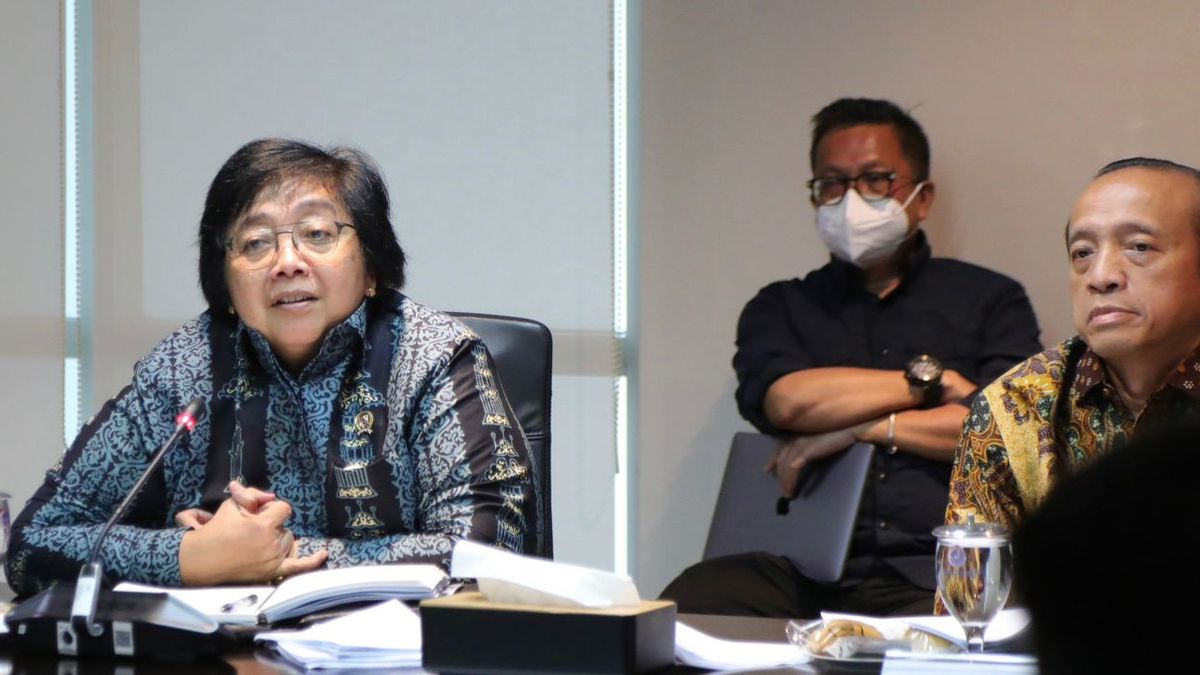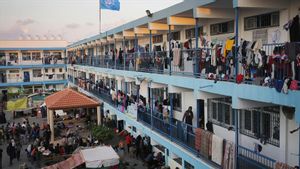JAKARTA - Minister of Environment and Forestry (LHK), Siti Nurbaya Bakar invites the younger generation to express innovative thoughts and actions in climate change mitigation in Indonesia.
This statement was made by Minister Situ Nurbaya when he presented awards to the winners of the national writing competition in the environmental, climate, and sustainability category at the University of Indonesia (UI) on Sunday, February 12, 2023.
"This activity (authorship of scientific works) is included in the scientific experience, because it aims to increase the literacy and interest of the younger generation in environmental issues and energy transition as well as to challenge the younger generation to collaborate and hone the ability to solve problems," he said in a statement in Jakarta, Monday, February 13, reported by Antara.
Minister Siti appealed to activists of the renewable energy community, lecturers, researchers, and students to actively voice their research results at the national and international levels.
The work of several researchers from various domestic universities at the Intergovernmental Panel on Climate Change (IPPC) strongly supports national interests, for example through the issuance of the 2006 Supplement of IPCC Guidelines for National GHG Inventories: Wetlands strongly supports the calculation of greenhouse gas inventory from peatlands.
In addition, the IPCC Special Report on Oceans and Cryospheres strongly supports Indonesia's efforts to explore the potential of blue carbon as well as the issuance of the IPCC AR6 Working Group I, II and III.
"Given that the involvement of Indonesian researchers at the IPCC is still dominated by the methodology of the land sector, I urge society renewable energy to help strengthen the science base of the IPCC for the energy sector," said Siti.
When referring to the IPCC Special Report 1.5 degrees Celsius 2018 and the IPCC Sixth Assessment Report Working Group I on the physical science basis of climate change which was published on August 7, 2021, during 2011 to 2020, global surface temperatures have increased by an average of 1.09 degrees Celsius with an increase in surface temperature of 1.5 degrees Celsius and a sea surface of 0.89 degrees Celsius.
In the intermediate scenario, global temperatures will continue to rise between 2.1 to 3.5 degrees Celsius. If there is no reduction in greenhouse gas emissions at a duration of 2020-2050, which is strongly dependent on ambitious efforts from 2020 to 2030.
"The increase in temperatures of 1.5 degrees Celsius will increase the intensity of rainfall and its subsequent impacts, such as flooding and drought in countries in Asia," said Siti.
He said that energy, climate, and sustainability issues are very important and strategic so that the younger generation can see, understand and study climate issues with the basics of analysis regarding energy.
According to him, the main source of energy in the planet Earth is the sun which can be converted into nuclear, chemical, hot, and mechanical or kinetic forms.
"The last three forms of energy are very closely related to the emergence of life on earth. The centrality of life on earth is photosynthesis, where sunlight is received and captured and stored by plants, and so on used by humans, plants are eaten, so there is un-block energy," he explained.
In the climate context, analysis of the energy balance and identification of ozone layer damage also use the concept of energy flow.
Energy emitted from the sun enters the earth with flow energy on the earth's surface and atmosphere. The interaction between the earth's surface and the atmosphere determines the energy balance of the planet.
Based on climatological, geographical, and demographic conditions, Indonesia is one of the countries that is vulnerable to the impact of climate change. On the other hand, Indonesia is one of the countries that produces large amounts of greenhouse gases into the atmosphere.
Minister Siti revealed that Indonesia has drawn up climate change mitigation and mitigation policies and actions to protect people's lives and national development, as well as to participate in global efforts to limit temperature increases to 1.5 degrees Celsius.
In addition, Indonesia has also ratified the Paris Agreement through Law Number 16 of 2016 and issued Presidential Regulation Number 98 of 2021 concerning Carbon Economic Values for the Achievement of Nationally Stimulated Contribution Targets (NDC) and Control of Glass House Gas Emissions in National Development.
The English, Chinese, Japanese, Arabic, and French versions are automatically generated by the AI. So there may still be inaccuracies in translating, please always see Indonesian as our main language. (system supported by DigitalSiber.id)









